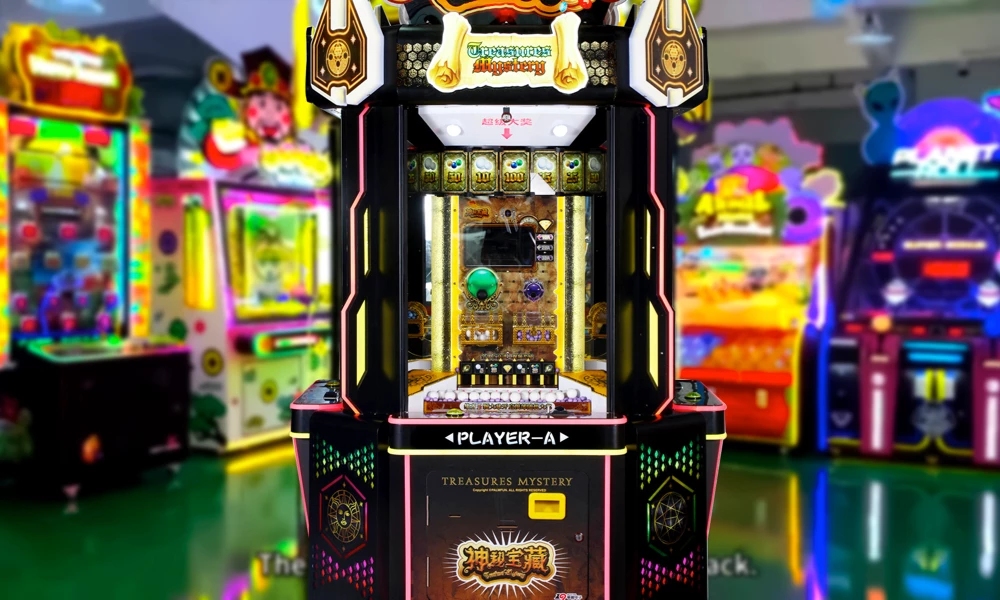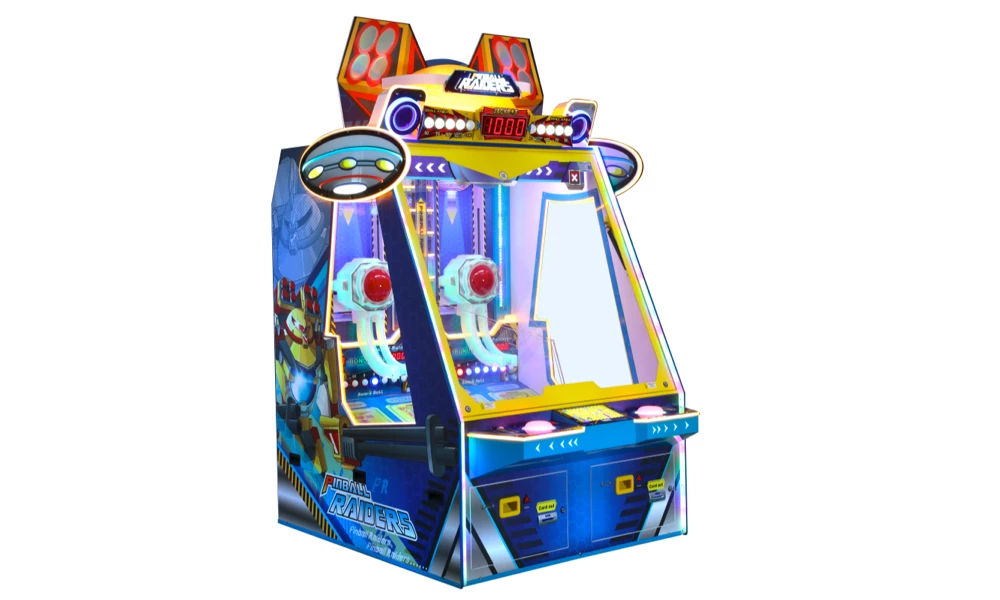are arcade games considered gambling? | Insights by PALM FUN
For redemption game machine operators, understanding the fine line between arcade amusement and gambling is crucial. This article delves into the legal definitions, key regulations, and the impact of prize values on classification. We cover best practices for compliance, ensuring your business thrives while adhering to local and federal laws, offering insights essential for informed re-purchasing decisions and sustainable growth in the amusement industry. Stay ahead with real data and expert knowledge.
- Are Arcade Games Considered Gambling? Unraveling the Legal Landscape for Redemption Machine Operators
- What Defines Gambling, and How Do Arcade Games Differ?
- Are Redemption Games Legally Considered Gambling?
- What Specific Regulations and Laws Impact Redemption Game Machines?
- How Do Prize Values and Redemption Structures Influence Legal Classification?
- Best Practices for Redemption Game Operators to Ensure Compliance and Business Growth
Are Arcade Games Considered Gambling? Unraveling the Legal Landscape for Redemption Machine Operators
For professionals in the redemption game machine industry, the question, Are arcade games considered gambling? is not merely academic; it's a critical business consideration that impacts legal compliance, operational strategy, and purchasing decisions. Navigating this landscape requires a deep understanding of legal distinctions, regulations, and industry best practices. Let's delve into the most common questions and provide the professional insights you need for successful re-purchasing and operation.
What Defines Gambling, and How Do Arcade Games Differ?
Legally, gambling typically involves three core elements: consideration (something of value risked), chance (the outcome is predominantly determined by luck), and prize (something of value won). Most jurisdictions require all three elements to be present for an activity to be classified as gambling.
Arcade games, particularly redemption games, are meticulously designed to avoid this classification. While they involve consideration (the cost to play) and a prize (tickets or merchandise), they often emphasize skill over pure chance. Games like Skee-Ball, Hoops, or Whac-A-Mole require hand-eye coordination, timing, or strategic thinking to maximize scores, thus reducing the element of pure chance. This distinction is paramount in their legal standing.
Are Redemption Games Legally Considered Gambling?
Generally, no, redemption games are not legally considered gambling, provided they adhere to specific regulations. The key differentiator for redemption games lies in the nature of the prize and the emphasis on skill. Unlike gambling, which often offers cash payouts or prizes of significant monetary value, redemption games offer tickets that are exchanged for merchandise prizes of relatively low, fixed value.
The absence of a direct cash payout and the principle that the prizes are typically non-monetary, consumer goods (e.g., toys, candy, small electronics) purchased from the operator's inventory, helps maintain their classification as amusement devices. For instance, many state statutes explicitly define amusement games, often distinguishing them from gambling devices based on prize type and value thresholds.
What Specific Regulations and Laws Impact Redemption Game Machines?
Regulations for redemption game machines are primarily determined at the state and local levels, varying significantly across jurisdictions. Key areas of regulation include:
- Licensing and Permits: Operators often need specific amusement device licenses or permits from municipal or state authorities. These are distinct from gambling licenses.
- Prize Value Limits: This is one of the most critical aspects. Many states impose statutory limits on the maximum retail value of prizes that can be awarded for an amusement game to avoid classification as gambling. For example, some jurisdictions may cap the prize value at $5, $10, or $25 for single-play redemption, or define it as a multiple of the game's cost. Operators must diligently research and adhere to their specific local limits.
- No Cash Payouts: Almost universally, redemption games are prohibited from offering cash prizes or cash equivalents. Prizes must be tangible merchandise.
- Skill vs. Chance Definitions: Some states have clear legal definitions distinguishing games of skill from games of chance, which can influence how a particular game is classified.
- Consumer Protection: General consumer protection laws also apply, ensuring fair play, transparent rules, and accurate prize representations.
It is imperative for operators to consult with legal counsel and thoroughly understand the specific statutes in every jurisdiction where they operate.
How Do Prize Values and Redemption Structures Influence Legal Classification?
The value and type of prize are perhaps the most significant factors in determining whether a redemption game skirts the line into gambling. As highlighted, cash prizes are almost universally forbidden. High-value prizes, even if non-cash, can also trigger scrutiny. Most regulations are designed to ensure that the cumulative value of prizes won does not create an incentive akin to gambling.
For example, if a game allows players to win an item with a clear market value exceeding a specific statutory limit (e.g., $500), even if it's not cash, it could be reclassified. The typical redemption structure involves accumulating tickets to exchange for a range of small, inexpensive items, creating an experience focused on amusement and tangible rewards rather than high-stakes winnings. Professional operators carefully curate their prize inventory to remain well within legal limits, often stocking items with a wholesale cost that ensures profitability while complying with prize value caps.
Best Practices for Redemption Game Operators to Ensure Compliance and Business Growth
To ensure your redemption game business remains compliant and thrives, especially when re-purchasing machines, consider these best practices:
- Thorough Due Diligence on Regulations: Before purchasing new machines or expanding, always verify the most current state and local laws regarding amusement and redemption games. Laws can change, and staying updated is non-negotiable.
- Focus on Skill-Based Games: Prioritize machines that genuinely involve a significant degree of player skill. This strengthens your position against any gambling claims. The global amusement game market is projected to continue its robust growth, with the overall Amusement and Theme Parks market expected to grow at a CAGR of 9.00% from 2023 to 2028, highlighting the continued demand for engaging, skill-based entertainment.
- Prudent Prize Management: Maintain strict control over prize inventory and valuation. Ensure all prizes fall well within legal maximum retail value limits. Regularly audit prize costs and retail values.
- Transparent Operations: Clearly display game rules, odds (if applicable), and redemption prize values. Transparency builds player trust and reinforces the amusement nature of your offerings.
- Quality Machine Maintenance: Ensure all machines are well-maintained and calibrated correctly to provide a fair and consistent play experience, reinforcing the skill aspect.
- Legal Counsel: Establish a relationship with legal counsel specializing in gaming and amusement law. Their expertise is invaluable for navigating complex regulations and making informed decisions.
- Reputable Suppliers: Partner with manufacturers and suppliers who understand and adhere to compliance standards, offering machines designed with legal parameters in mind.
PALM FUN Advantages for Your Re-purchasing Decisions:
When considering your next redemption game machine purchase, PALM FUN stands out as a strategic partner. We specialize in designing and manufacturing innovative, high-quality redemption games engineered for both player engagement and legal compliance. Our machines are built with robust construction, cutting-edge technology, and a keen understanding of global amusement regulations, ensuring your investment is secure and profitable. PALM FUN provides a diverse portfolio of skill-based games that cater to various demographics, offering high entertainment value and strong ROI potential, all while adhering to the highest industry standards for amusement, not gambling. With PALM FUN, you're investing in reliability, compliance, and a partner committed to your long-term success in the dynamic amusement industry.







COINTOPIA by PALM FUN is an exciting redemption game machine where players enjoy fun with zodiac buddies in a utopia setting. This ticket redemption machine offers engaging gameplay and rewarding experiences, perfect for family entertainment centers and arcades seeking top-quality redemption games.

Copyright © 2026 PALM FUN All Rights Reserved. | Privacy Policy • Terms and Conditions | Sitemap










palmfun_arcade
Palm Fun Arcade Game
Whatsapp: +8618126837443
PalmFun Arcade
PalmFun_Arcade
PALM FUN Redemption Machine